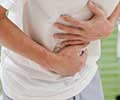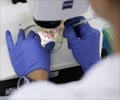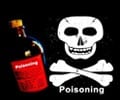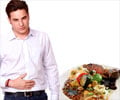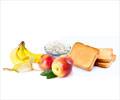Causes, Risk Factors and Types of Food Poisoning
Bacteria, virus and parasites are the causal agents of food-borne illness. The contamination of food can occur at any point beginning from growing, till processing and shipping of the produce. Improper cooking of the food may also be the cause. Another cause can be when pathogens are transferred from one surface to another especially in case of ready-to-eat foods or raw foods. Since these foods aren’t cooked before consumption, pathogens are not destroyed and ingesting them may lead to food poisoning. This is called cross-contamination. According to Professor Tom Humphrey of the Institute of Infection and Global Health, University of Liverpool. ‘The vast majority of food poisoning occurs because of under-cooking or cross-contamination of food.’
Food poisoning may be mild or severe. Sometimes, it may result in long-term health problems and even death. Incidentally, infants and children less than 5 years of age and elderly people over 70 years of age are at greater risk for food poisoning. Pregnant women and people with chronic disease such as diabetes, liver disease or AIDS are also at a higher risk.
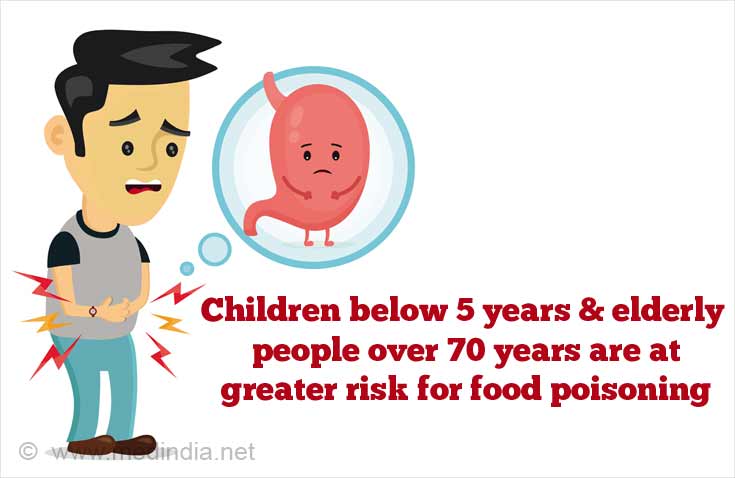
Types of food poisoning include:
- Botulism - This is an acute illness leading to paralysis caused by Clostridium botulinum bacteria which is found in soil and untreated water. The bacteria mostly affect foods such as home-canned vegetables, cured pork and ham, smoked and raw fish, honey and corn syrup. Most cases of botulism are found in infants eating honey or corn syrup. Immediate medical attention is required in such cases since prompt treatment reduces the risk of death.
- Bacterial or infectious diarrhea - This is an infection of the small intestine caused by Campylobacter jejuni. This is also the cause of a type of traveler’s diarrhea. Although this infection goes away on its own, severe symptoms may require antibiotic treatment. It is necessary to avoid dehydration by drinking electrolyte solutions to replace lost fluids.
- E. coli enteritis - Also known as ‘Hamburger disease’, it is an inflammation of the small intestine caused by E. coli bacteria. It normally lives in the intestine without causing any problems but the strain E. coli O157:H7 can cause severe food poisoning. A severe, sometimes bloody diarrhea is the most common symptom of this inflammation. Complications can cause severe anemia or even kidney failure.
- Fish poisoning - Caused by the fish tapeworm Diphyllobothrium latum, the infection occurs when people eat uncooked or undercooked freshwater fish. Most people who are infected with this parasite have no symptoms. Some have symptoms such as abdominal cramps, diarrhea and sometimes weight loss. A single treatment dose is sufficient to remove this parasite.
- Listeriosis - This is a serious type of food-borne illness caused by Listeria monocytogenes bacteria that exist in the form of a colony or community called ‘biofilm’. In their review article on Listeria, T. Møretrø and S. Langsrud from Norwegian Food Research Institute, Norway, state ‘This organism can be introduced through many routes to food-processing environments and may become established on food-processing equipment. Subsequently, food products may become contaminated during processing. In addition, the bacterium can grow at refrigeration temperatures’. They found that ‘Listeria monocytogenes can adhere to all the materials commonly used in the food industry. In biofilms L. monocytogenes is significantly more resistant to disinfection than its free-living counterparts and thick, complex biofilms are more difficult to remove than adherent single cells of L. monocytogenes’.
- Salmonella enterocolitis - Swallowing food or water contaminated with salmonella bacteria causes this common type of food poisoning. It infects the lining of the small intestine in people mainly below 20 years of age. Avoiding milk products and changing to a BRAT (banana, rice, applesauce, and toast) diet may help reduce symptoms.
- Staphylococcus aureus - This common bacterium has the ability to make 7 different toxins responsible for food poisoning. These toxins are resistant to heat and cannot be destroyed by cooking. Sliced meat, contaminated milk and cheese, sandwiches, pastries and puddings are examples of food that cause staphylococcal food poisoning.

